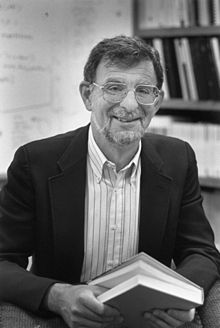This article has multiple issues. Please help improve it or discuss these issues on the talk page . (Learn how and when to remove these messages)
|
David Klahr | |
|---|---|
 | |
| Nationality | American |
| Known for | Computational models of cognitive development Dual space search theory of scientific reasoning Member of the National Academy of Education |
| Scientific career | |
| Fields | Developmental psychology Cognitive psychology Cognitive development Psychology of science Educational psychology |
| Institutions | Carnegie Mellon University |
David Klahr (born 1939) is an American psychologist whose research ranges across the fields of cognitive development, psychology of science, and educational psychology and has been a professor at Carnegie Mellon University since 1969. He is the Walter van Dyke Bingham Professor of Cognitive Development and Education Sciences at Carnegie Mellon University and a member of the National Academy of Education, a Fellow of the American Psychological Association, a Charter Fellow of the Association for Psychological Science, on the Governing Board of the Cognitive Development Society, a member of the Society for Research in Child Development, and the Cognitive Science Society. He was an associate editor of Developmental Psychology and has served on the editorial boards of several cognitive science journals, as well as on the National Science Foundation's subcommittee on Memory and Cognitive Processes, and the National Institutes of Health's Human Development and Aging Study Section.
Contents
He has served on three committees of the National Research Council: the Committee on Foundations of Educational Assessment (Knowing What Students Know, National Academies Press, 2001), the Committee on Research in Education (Advancing Scientific Research in Education, National Academies Press, 2004) and the Committee on Science Learning (Taking Science to School: Learning and Teaching Science in Grades K–8, National Academies Press, 2007). He also serves as member of the advisory board for the Brain, Mind & Behavior Program of the James S. McDonnell Foundation.